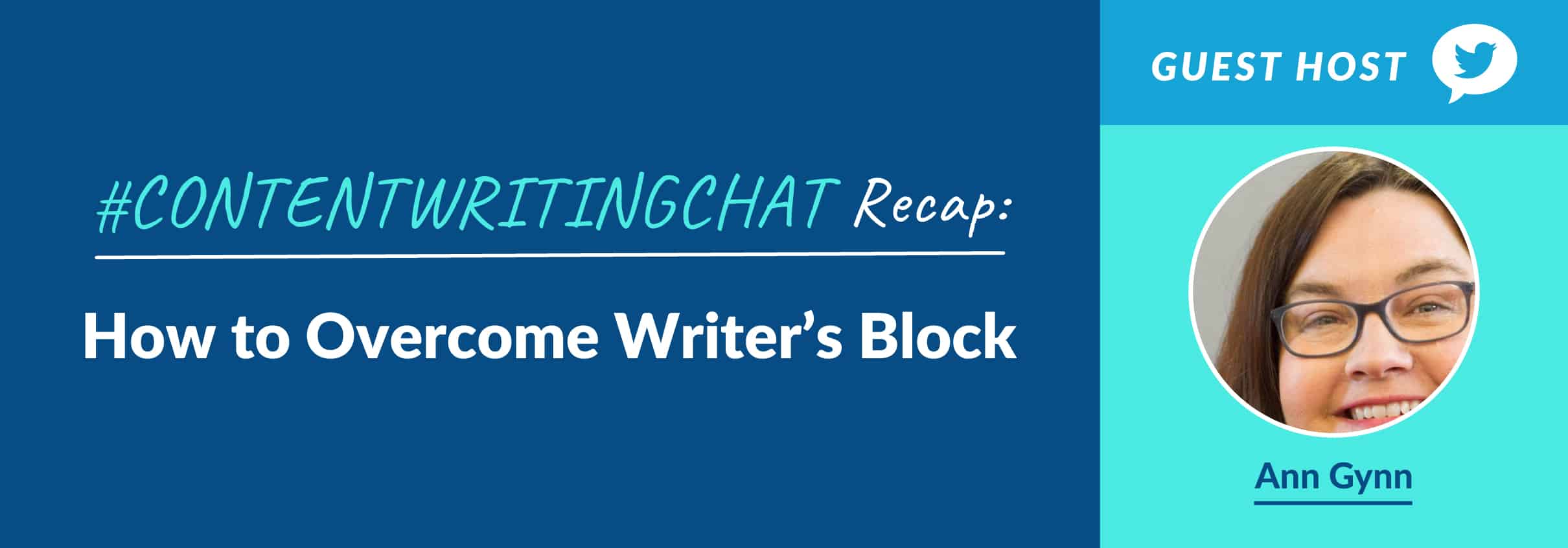#ContentWritingChat Recap: How to Overcome Writer’s Block with Ann Gynn
As content creators, sometimes we fall victim to the dreaded writer’s block. It’s frustrating. And it’s stressful. It’s the last thing anyone wants to deal with, especially with a deadline looming in the near future! If you want to learn how you can overcome writer’s block, you’re in the right place. This #ContentWritingChat recap covers how to determine if you’re really dealing with writer’s block, how to confront it head on, and what to do if it keeps happening to you. #ContentWritingChat Recap: How to Overcome Writer’s Block with Ann Gynn Hey, everyone! Welcome to #ContentWritingChat! Our guest host for today’s chat is @anngynn. She’s an Editorial Consultant for our friends over at @CMIContent. Ann will be sharing some tips on overcoming writer’s block, which we can all use help with! pic.twitter.com/HGXYtneTcs — Express Writers | Your Content Writing Partner (@ExpWriters) October 6, 2020 Our guest host for this month’s chat is Ann Gynn. She’s an Editorial Consultant for our friends over at Content Marketing Institute. Ann wrote a post for their blog all about beating writer’s block, so we knew we had to have her guest host and share some tips with us. So, let’s dive into the recap! Q1: What does writer’s block really mean? Before we dive into the helpful tips, we need to get to the bottom of what writer’s block really is. Here are some of the responses we received from our chat participants: A1: Short term: You need to write but can’t articulate on paper (or screen) what needs to be said. #ContentWritingChat — Ann Gynn (@anngynn) October 6, 2020 A1: Long term: A mindset of people who generally find writing problematic. #writersblock #ContentWritingChat — Ann Gynn (@anngynn) October 6, 2020 Ann views writer’s block in two different ways, short-term and long-term. In the short-term, she feels it’s struggling to articulate what you’re trying to say. But in the long-term, she says it’s a mindset of those who generally find writing problematic. A1: I think writer’s block can be two things. One, staring at your computer or paper and having no idea what to write. Two, struggling to put the thoughts in your head into words that will make sense to others. #ContentWritingChat pic.twitter.com/yutYeE6IhZ — Netvantage Marketing (@netvantage) October 6, 2020 Lexie also views writer’s block in a couple of different ways. On one hand, it could be feeling unsure of what to write, but sometimes it’s struggling to put your thoughts into a written piece that makes sense. A1. I don’t think it’s anything to do with the words. I think it’s about state of mind. You’re not in the mood to write – you’re tired or preoccupied with something. If there’s an issue with the brief, that’s down to the client, not you. #ContentWritingChat — Katie Thompson (@katielingoyork) October 6, 2020 Katie believes writer’s block is all in your mindset. Sometimes you’re just not in the mood to write, maybe you’re tired or other thoughts are consuming your mind. A1: I describe writers block as a tornado of all the wrong words flying around all the right words in my head. And it’s so difficult to get the right words down. #ContentWritingChat https://t.co/ovaEFLpzzQ — Karly (@karlycay) October 6, 2020 And sometimes you just might have too much going on in your head that it’s hard to get it all out onto paper or on the screen. Q2: How do you know if it’s writer’s block or a problem with your preparation (i.e. research, interviews, etc.)? Sometimes you might not be dealing with writer’s block. It could be a different problem holding you back! Here’s how to get to the root cause: A2: Take a moment. Review the creative brief and your notes. See if you have all the sources and information necessary. If not, revisit your prep. #ContentWritingChat https://t.co/mRz7rchfzl — Ann Gynn (@anngynn) October 6, 2020 A2: Or write a simple “outline.” List the headline and subheads. (Don’t worry about making them precise.) If that’s a struggle to put together, your writer’s block probably is a prep problem. #ContentWritingChat https://t.co/mRz7rchfzl — Ann Gynn (@anngynn) October 6, 2020 Ann’s advice is to review your notes and see if you have all the information necessary to create a great piece. If not, you’ll have to go back to the prep stage. She also finds it helpful to write a simple outline of your article to get started. A2: If you can create a well-structured outline, it is writer’s block, not a lack of preparation. If you can’t make an outline, then you should do more research and come back to writing after that. #ContentWritingChat — Netvantage Marketing (@netvantage) October 6, 2020 Lexie agrees that creating an outline is helpful. If you can create an outline, odds are it’s just writer’s block and not issues with your prep. However, if creating the outline is a struggle, it’s time to do more research. Q3: How can you overcome writer’s block? Now, let’s get into the really good stuff. Here’s some advice on how you can overcome writer’s block the next time it creeps up: A3: I have a few ideas on this. Reframe your thinking. Break your tasks into pieces – intro, subheads, conclusion. Do each one at a time. Reward yourself for completing each piece: Chocolate bite (@PRisUs tip). Fun site on Internet. Text friend. #ContentWritingChat https://t.co/BoJEnAWdaU — Ann Gynn (@anngynn) October 6, 2020 These tips that Ann shared are great, especially reiterating Michelle’s advice on snacking on some chocolate! A3: Set deadlines for the individual pieces of your writing. Put them on the calendar and schedule something after. Ex: 11:15-11:45 a.m. Introduction; 12 p.m. Lunch w/Juanita; 1:30 to 3 p.m. Body of article. #ContentWritingChat https://t.co/BoJEnAWdaU — Ann Gynn (@anngynn) October 6, 2020 Another awesome tip that Ann shared was to break down your article into smaller tasks and assign deadlines for each. For example, blocking off time in your calendar for writing the introduction and then tackling the body later. A3. Just step … Read more

